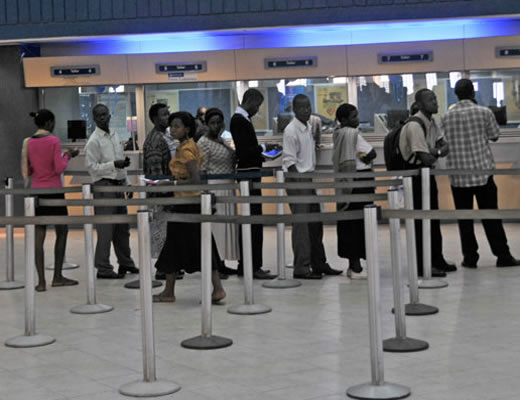We think the four Nigerian banks in our coverage universe that are best placed to pull through the challenges are Guaranty Trust Bank (GTBank), Access Bank, Zenith Bank and United Bank for Africa (UBA). We recently met with management teams for an update on the operating environment. We update our forecasts, pushing up our TPs across the sector, and maintain our OUTPERFORM ratings on all four banks.
NPLs yet to bottom out, capital at risk
We think sector NPLs are yet to bottom out, and we expect some deterioration in the sector over the next few months. We estimate that in the event of a further 50% devaluation in the naira, of the tier 1 banks only Access and Zenith would have CARs above the regulatory minimum. However, if we factor in revaluation gains from a devaluation, this should also provide GTBank and UBA with sufficient capital buffers. If we see a more marked devaluation in FY17, the CBN could explore the option of allowing the banks to use pre-devaluation FX rates in calculating prudential ratios – similar to what happened in Russia in 2014.
No safety net this time round
We think a second Asset Management Corporation of Nigeria (AMCON) scenario is unlikely because: 1) the country lacks the financial resources to fund such a programme; and 2) the banking sector is in a much stronger position today than seven years ago, despite current headwinds. When AMCON was set up, nine out of 24 banks failed to meet any of the CBN’s prudential requirements on liquidity, capital and corporate governance; currently, however, only a couple of banks are in breach of CBN guidelines. At the time AMCON was set up, sector NPLs peaked at 38%, vs 13.4% currently. There had previously been extended periods of poor credit writing practices, and a build-up of asset quality and margin lending crises in the sector. We think increased forbearance by regulators is a more realistic alternative to the introduction of AMCON 2.
Buy cheap, buy twice
We think given poor implementation of the June 2016 liberalisation framework, we are likely to see another devaluation. Our economist Yvonne Mhango thinks the most probable outcome of an FX policy adjustment is a managed float, with possibly a new peg. For the smaller banks, this implies further asset quality and capital stress. The smaller banks do not have sizeable net long FX positions, so we think another devaluation will be net negative for the tier 2 banks in our opinion. On our estimates, tier 2 banks in our coverage are trading on an average FY17E P/B multiple of 0.3x, but we think this is justified given the much lower RoE (FY17E average RoE of 8%) and the significant downside risks to performance.
Battle of the giants – stick to quality
The current operating environment presents an opportunity for the tier 1 banks to further consolidate the market, in our view. As at 9M16, FBN Holdings (FBNH), Zenith, GTBank, UBA and Access controlled c. 66% of total market assets, up from c. 55% in FY15. We think it is important to stick to quality in this environment, and have a relative preference for GTBank, Access, Zenith and UBA having assessed their performance on key metrics. Zenith (looking at the Nigerian operations only) has now passed FBNH’s First Bank of Nigeria as the biggest bank by total assets. For FBNH, we think fixing its capital issues is key to regaining market share.
Nigerian banks: Fantastic four-Rencap
